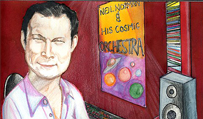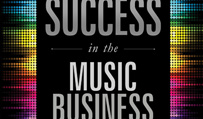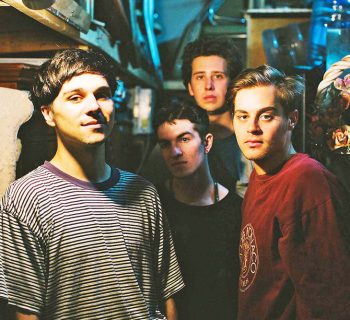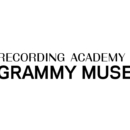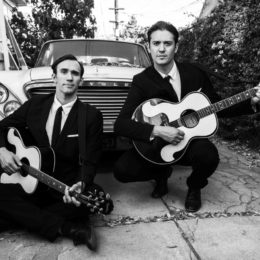![neilcartoon[1]](https://www.musicconnection.com/wp-content/uploads/2013/10/neilcartoon1.jpg) Neil Norman
Neil Norman
President
GNP Crescendo Records
Years with Company: 40
Address: Burbank, CA
Web: http://gnpcrescendo.com
Clients: The Ventures, Robin Trower, Savoy Brown, Queen Ida, Malo,
Alexander Courage
BACKGROUND: When media personality Gene Norman founded the Crescendo, the club’s popularity was so great it spawned a label. His son, Neil, has been associated with GNP (aka Gene Norman Presents) Crescendo ever since. He’s worked every position there, as well as produced and been a musician himself, specializing in the science fiction genre. While GNP approaches its 60th anniversary, Norman is busy putting the finishing touches on a documentary about the label’s seminal garage band, the Seeds.
Early Exposure: [My dad] was the number one jazz disc jockey on the West Coast and that led to concerts. In 1954, he opened The Crescendo nightclub. That went from ‘54 to ‘64. It was the number one nightclub in Los Angeles. Woody Allen, Johnny Mathis, Don Rickles, Mort Sahl, Joey Dee and the Starlighters, Herb Alpert and the Tijuana Brass, Bob Newhart and Stan Kenton all played there. Anyone who was anyone played there. I used to walk down the Sunset Strip with Lenny Bruce when I was a boy. I met Louis Armstrong and Duke Ellington and Dick Gregory and Jonathan Winters. They all worked there and knew me. I was precocious and my dad let me do whatever I wanted. So I would run the lights, spank the waitresses, meet all these stars and heard all this incredible music.
Survivors: We have a staff of eight or nine people, but it varies. A lot of people moonlight, especially since the business shrank. Hundreds of labels like ours went under in the last 50 years. We’re the oldest surviving independent record company under continuous ownership in the world. I’m very proud of that, because it’s a difficult business. People have to have gasoline and tires and groceries, but they don’t have to have records. Also, the new generation is kind of taking music for granted and they steal it. That’s part of why the business is a fraction of what it used to be. It’s kind of been pared down to the people who still love it with all their heart, like my dad and me.
Thinking Realistically: [Our secret is] having ears, being clever and having a hit once in a while. And not getting a big ego. Some people, when they make a little money or have a hit, go out and buy Rolls Royces and mansions. And then when it slows down, they lose it all. Even if you’re successful, you have to be sort of conservative because you never know that it’s going to continue and it usually doesn’t.
Fans of Artists, Not Genres: Sky Saxon made a lot of money with the Seeds and thought it was going to last forever. He thought he was Elvis and blew all the money. I’m making a movie about him and the Seeds. It features members of the Beach Boys like Bruce Johnston and John Echols from Love and a lot of other stars. It’s called The Seeds: Pushin’ Too Hard.
Holding On: It’s fun to see that vinyl is making a resurgence. When majors were throwing away vinyl, we kept it. So we have a good stash of vinyl and we’re pressing more. [Cassettes have] slowed down, but I met someone the other day who’s becoming active. That came as close as possible to dying, but they still sell. When you’re attached to the product, your soul is in it, your hard work and money, if something goes a little out of favor you’re not going to chuck it in the trash. Majors would destroy vinyl when CDs were hot in the ‘80s. That helped me a lot when things were tight, because I still had the inventory we created. It just had to snooze for a while.
Sign for Love: We look at the long term. We’ve made a lot of records that took us years to get our money back, but we knew it was the right thing to do and we dug it. People say, how’d you know the Seeds were going to be a hit? It’s the same with science fiction music. Star Trek music? What are you doing? By the time it lit on fire, I was in the driver’s seat. But I did it because I liked it. My father used to play Nat King Cole on the radio. He wasn’t that famous and then he became one of the biggest stars in the world. People would say, how’d you know he was going to be so big? My dad would say, “I didn’t. I just knew he was great.” So you’ve got to follow your heart and your ears.
Picking Up Where Majors Leave Off: Sometimes, we’ll go after people who are already famous, but they’re down on their luck. They’ve had a couple of unsuccessful records, so the majors drop them and you pick them up. We had a couple of big albums with Robin Trower. Passion was the Best Rock Album of the Year for independent labels. All the majors dropped him, because he wasn’t selling as much. After we made a better album, which I produced, his price for gigs quadrupled. I’m proud of that.
The Solicitation Dream: To make an album and send it out, that’s very difficult. Never send more than four songs, because no one’s going to listen to more than that. If they like it, they’ll ask for more. You can’t hide a hit. If it’s that good, they’ll get back to you. It’s rare that someone unknown sends something to somebody and they say, “Yeah, that’s fantastic. Let’s sign them.” That’s a pipe dream.
Appreciate What Labels Can Do: We usually sign [our artists] to an exclusive recording contract, because there’s nothing without exclusivity. We’re also music publishers. We set them up with physical product, downloading and licensing throughout the world. We set up promotion, get their material in movies, get them on compilations, get complete foreign distribution from Africa to Italy to Australia. We set them up with all the downloaders, all the aggregators. It’s a lot of work. People are always bad rapping record companies. That’s baloney. Of course there are bad apples, but the record companies are the ones that promote you and make you a success at their expense. Seven out of 10 records are going to lose money. So they’re risking their money and hard work to promote you. People need to see the balance of that situation.
A Lifetime of Support: We stay with [our artists] forever. We just got the Seeds in a Nike commercial 45 years after it was done. I have a John Mayall album that’s 20 years old and I’m pressing vinyl on it, because I know it’s a great album. At a major, they wouldn’t get to it. It would just sit there. We get to things. We’re small but powerful and you can get us on the phone and get decisions. In a big company, everything’s by committee and you don’t really know where you stand.
Making A Superior Product Is Job One: We’re the recipients of many awards of excellence. And we produce and do outstanding products. We have many albums on Amazon that have five stars. We produced the book The Outer Limits Companion. We have integrity, quality and stability.
Long-term Relationships: We’re sending royalties to people who made records in the ‘40s. Some of our Hawaiian [recording artists], their great grandsons are collecting royalties. One of them, their grandmother brought them in and said, “I want you to meet Gene and Neil. They’re going to send you money every year.” I’m very proud of that. Our artists have stayed with us for decades. It’s not one year or three years or seven years. It’s decades. We won a Grammy with Queen Ida in 1981 for Best Ethnic Blues Recording. She’s in her 80s and still performs. And she’s still signed to GNP Crescendo. She has an income from us every year.
Pushin’ Hard: Push on and fight for what you love. Whether it’s music or film or whatever, keep trying to figure it out. Be consistent, be of high quality and be ethical. We like submissions; just keep it brief and if we love it we’ll get back to you.
By Andy Kaufmann

